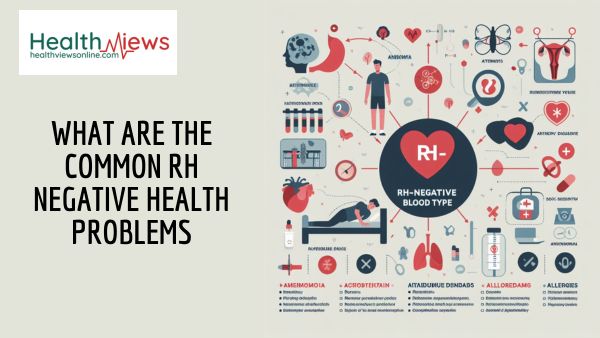Rh disease manifests itself during pregnancy. When the Rh factors in the mother’s and child’s blood do not match, this condition occurs. It may also occur if the mother and child have different blood types. You are Rh-negative if your blood lacks the protein. The “+” or “-” after your blood type indicates whether you are Rh-positive or Rh-negative. While Rh-negative people do not typically experience specific health issues as a result of their blood type, there are some related common Rh-negative health problems to be aware of.
Also, Read All About Astrocytomas: Types, Symptoms, Causes, Prevention
Top 10 Common Health Rh Negative Health Problems with Symptoms, Prevention, and Care Tips
As a Rh-negative person, you can have the same health problems and face the same health risks as Rh-positive people. Common health issues include:
1. Heart disease
Symptoms: Chest pain, shortness of breath, fatigue.
Prevention: Maintain a healthy diet, exercise regularly, manage stress, avoid smoking, and use alcohol in moderation.
Care tips: Don’t use tobacco or smoke, aim for at least 30 to 60 minutes of physical activity per day, consume a heart-healthy diet, keep a healthy weight, get plenty of rest, control your stress, and get routine health screenings.
Also, watch health views web stories: What is MCH in Blood Test?
2. Hypertension (high blood pressure)
Symptoms: Usually asymptomatic, but in extreme cases can cause headaches, nosebleeds, and visual issues.
Prevention: Maintaining a healthy weight, eating a low-sodium diet, exercising regularly, and managing stress.
Care tips: Follow the instructions of your healthcare practitioner and monitor your blood pressure regularly.
3. Diabetes
Symptoms: Increased thirst, frequent urination, unexplained weight loss, and weariness are all symptoms.
Prevention: Maintain a balanced diet, exercise regularly, and control your weight.
Care tips: Prepare and consume nutritious foods, be active daily, check your blood sugar levels frequently, take your medications, learn how to deal with stress, deal with the emotional aspects of diabetes, and schedule checkups.
4. Obesity
Symptoms: Excessive weight gain.
Prevention: Maintain a balanced diet and engage in regular physical activity.
Care tips: Consult with a healthcare expert to develop a personalized weight management plan.
5. Osteoporosis
Symptoms: Bone pain, fractures, loss of height over time.
Prevention: Consume sufficient calcium and vitamin D, engage in weight-bearing exercises, and avoid smoking and excessive alcohol consumption.
Care tips: Follow the advice of your healthcare practitioner and have regular bone density examinations.
6. Cancer
Symptoms: Vary depending on the type of cancer but may include lumps, changes in bowel or bladder habits, unexplained weight loss, and fatigue.
Prevention: Maintain a healthy lifestyle, including a balanced diet, regular exercise, and abstaining from cigarettes and excessive alcohol consumption.
Care tips: Early detection through screenings is critical; visit a healthcare provider for recommended tests.
7. Anxiety and Depression
Symptoms: Persistent sadness, irritability, nervousness, and physical symptoms like headaches or stomach aches.
Prevention: Increase awareness of mental health issues and stress-reduction measures.
Care tips: Consult a mental health professional for an evaluation and treatment options.
8. Sexually Transmitted Infections (STIs)
Symptoms: Depending on the infection, symptoms may include discomfort, drainage, sores, or none at all.
Prevention: Practise safe sex, wear protection, and get regular STI testing.
Care tips: If you suspect you have an STI, see your doctor for testing and treatment.
9. Asthma
Symptoms: Wheezing, coughing, shortness of breath, and chest tightness.
Prevention: Avoid triggers, stick to medication routines, and keep your living environment clean.
Care tips: Have an asthma action plan and a rescue inhaler on hand if prescribed.
Also, watch health views web stories: 8 Best Home Remedies for Hemorrhoids
10. Accidents and Injuries
Symptoms: Depend on the type of injury, such as wounds, fractures, or concussions.
Prevention: Promote safety awareness, wear protective equipment, and educate responsible driving.
Care tips: For major injuries, seek immediate medical assistance; for lesser injuries, follow emergency care protocols.
In conclusion, there are no specific common Rh Negative health problems. The Rh factor (Rhesus factor) is mostly concerned with blood compatibility and does not cause or increase the risk of certain health issues. Health issues are complex and are caused by a combination of hereditary, lifestyle, and environmental factors.
If you have Rh-negative blood, you should be aware that you may face the same health risks as people with Rh-positive blood. Focusing on broad preventative measures, such as frequent medical check-ups, a balanced diet, physical activity, stress management, and avoiding risk factors specific to your health profile, is the key to sustaining good health.
It is best to contact a healthcare expert who can provide personalized suggestions based on your specific health needs and circumstances for personalized health advice, risk assessment, and guidance on maintaining a healthy lifestyle.
Also, Read Lung Disorder Chronic Bronchitis: Causes, Symptoms, Treatment





